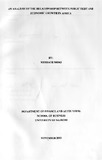| dc.description.abstract | Almost all developing country governments face budget deficit due to high expenditure
and fewer revenues. Governments can get revenue by increasing taxes, printing money,
domestic or external borrowing and using previous budget surplus. When the government
decides to borrow instead of introducing additional tax measures, to finance the budget
deficit, it creates a liability on itself known as public debt.
The purpose of this study was to investigate the relationship between national debt and
the economic growth of African countries. The findings from this study are important to
policy makers, politicians and the academic community. First, the findings will inform
policy makers and national planners on the long run effect of debt on economic growth.
This can inform their future policy and decision making on matters relating to national
debt. This also can inform government officials on how debt affects the economy and can
inform their decisions on how to deal with past and present debts.
The causal research design was used to carry out this study. The target population of this
study was all the 53 recognized countries. The study covered data spanning a period of 30
years from 1980-2010. The study utilized the SPSS software Version 20 to do a multiple
regression analysis. Dependent variable was economic growth as measured using GDP
while independent variables were public debt, investments, human capital, monetary
policy, trade openness, foreign direct investment and political climate.
Study findings indicate public debt has a significant positive relationship on economic
growth. Investment however, is not a significant predictor of economic growth. Human
capital is another factor which positively influences the economic growth. Monetary
policy which was measured using inflation rates had a negative relationship with GDP
but this relationship was not significant at 10% level. Trade openness which was
measured using net exports is another factor which showed a significant positive effect
on economic growth. FDI is another factor which showed a significant positive effect on
economic growth while political risk indicated to have a significant negative relationship
with economic growth.
From the study results, the following recommendations are made. First, African countries
should manage their public debt levels for investment in capital projects to improve their
economic growth. Secondly African countries should improve on human capital
development, FDI inflows and political risk to have a positive improvement on their
economic growth and development. This can be done by having public policies and laws
that encourage investments, property ownership, dispute resolution and encouraging the
rule of law and democratic institutions. | en |

